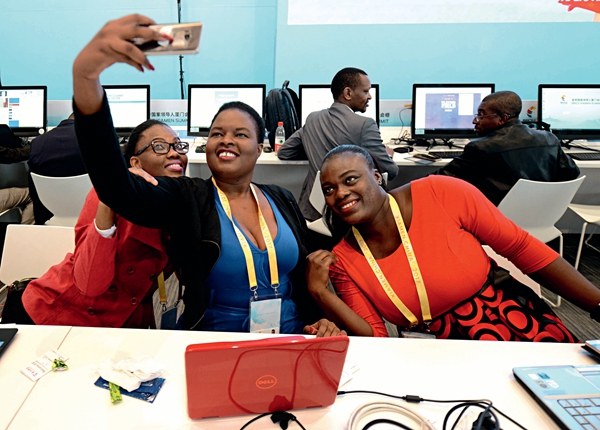An Expanding Circle of Friends
China Today by Lin Minwang,January 05, 2018 Adjust font size:
Actively Planning Major-Power Relations
Playing a vital role in China’s foreign affairs, major-power relationships maintained a steady development in 2017. For instance, its relations with the U.S. have remained sound and opened up new prospects in cooperation. High-level strategic cooperation with Russia has been strengthened, and fresh steps have been made in building the China-EU partnership for peace, growth, reform, and prosperity.
Donald Trump took office as the 45th president of the U.S. last January. His protectionist tone and some “shoot from the hip” remarks have more or less caused concern for Sino-U.S. relations. In their phone conversation on February 10, Xi and Trump exchanged views on issues of common concern. The visit to the U.S. made by State Councilor Yang Jiechi in February and the visit to China made by Secretary of State Rex Tillerson in March have led the bilateral ties onto the track of enhanced exchanges.

Three journalists from Africa take a selfie at the news center of BRICS Xiamen Summit on September 3, 2017. Around 3,000 journalists from 80 countries and regions gather in Xiamen to cover the summit.
Later in April, the heads of the two states held their meeting in the Mar-a-Lago resort in Florida where they underlined the strategic importance of the bilateral relationship, and agreed on facilitating its further development from a new starting point. What’s more, Trump’s state visit to China in November marks a smooth transition in bilateral relations.
China and Russia have maintained close consultation and coordination on key international and regional affairs. In addition to progress made in fields such as energy, investment, and finance, the two countries are actively exploring ways to connect the Belt and Road Initiative with the Eurasian Economic Union.
Russia has always supported the Belt and Road Initiative. Russian President Vladimir Putin participated in the Belt and Road Forum for International Cooperation in Beijing in May. His Chinese counterpart Xi paid a state visit to Russia later in July. Besides, the two leaders met on other occasions including the Astana summit of the Shanghai Cooperation Organization in June and BRICS summit in Xiamen in September.
Sound strategic cooperation between China and Russia is not only a strong underpinning for China’s major-country diplomacy, but also functions as a ballast of world peace and stability.
The China-EU relationship has also witnessed further advancements. During his visit to Europe in 2014, Xi called for building partnership for peace, growth, reform, and civilization with the EU. In the past year, the partnership has been strengthened, shown by frequent meetings between senior officials of the two sides.
In January, Xi visited Switzerland, and delivered a speech at the annual meeting of the World Economic Forum held in Davos which has been widely echoed in the international community. In early April, he visited Finland, his first trip to the Nordic region as president of China. He met with many more leaders of European states when he visited Germany and attended the 12th G20 summit in July.
In their talks, the U.K. Prime Minister Theresa May reaffirmed that China-U.K. relations are in a “Golden Era.” During a meeting with his French counterpart Emmanuel Macron, Xi noted that bilateral ties should be viewed in a strategic context and from a long-term perspective so as to work towards better Sino-Franco relations. Chancellor Angela Merkel’s reelection in September has guaranteed stability of the China-Germany relationship.
In addition, a range of new cooperation initiatives on deepening China-EU comprehensive strategic partnership for mutual benefit were reached when Premier Li Keqiang met with President of the European Council Donald Tusk and President of the European Commission Jean-Claude Juncker at the 19th China-EU Summit in Belgium in June.